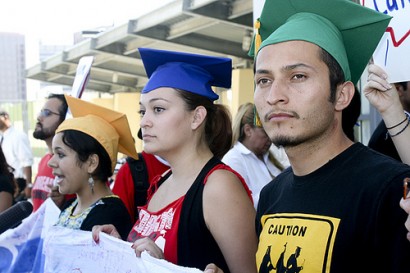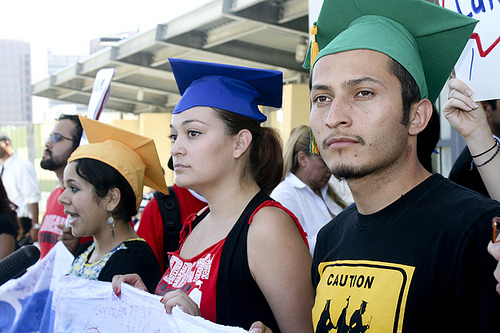
A rally for the DREAM Act in Los Angeles, CA. (Photo: Antonio Villaraigosa/flickr)
President Obama holds the power to realize the ultimate dreams of undocumented youth—but he’s choosing not to wield it.
Last week, nearly 100 immigration law professors sent a letter to the president, a former law professor himself, arguing that Mr. Obama should exercise his authority to grant relief to undocumented youth.
The academics write that their missive seeks “to explain that there is clear executive authority for several forms of administrative relief for DREAM Act beneficiaries: deferred action, parole-in-place, and deferred enforced departure.”
Deferred action can prevent an individual from being placed in deportation proceedings, suspend any proceedings that have commenced, or stay the enforcement of any existing deportation order. Parole-in-place permits a noncitizen, on a case-by-case basis and for urgent humanitarian reasons or significant public benefit, to remain lawfully in the United States. Deferred enforced departure (DED) is closely related to deferred action. Individuals covered by DED are not subject to deportation, usually for a designated period of time. Individuals, under all three situations, can also be authorized to work legally.
Hiroshi Motomura, the Susan Westerberg Prager Professor of Law at UCLA, challenged any doubt that the president can use his executive prerogative.
“There is definitely executive authority. There is not just legal authority but historical authority. Not only that, but there is a degree of surprise [among the law professors] that there could be any doubt about this question,” Motomura said.
America’s Voice, an immigration reform advocacy group, points out that this letter is only the latest attempt to persuade President Obama to act on behalf of undocumented youth.
In April 2011, 22 US Senators sent a letter asking Obama to provide relief for DREAMers; a month later, a number of former INS officials weighed in on the authority of the executive branch. Last month, the United We DREAM network launched the “Right to DREAM” campaign featuring rallies, marches, and protests around the country. Leaders from United We DREAM have also in recent days met with senior White House officials and key Congressional offices, including five Republican Senators or their staff.
In spite of the pressure from immigrant activists, the president has insisted that it is Congress’ job to pass the DREAM Act, not his. It is not difficult to figure out why Mr. Obama refuses to act, even though he very well could. With Election Day five months away, he doesn’t want to be accused of diverting his attention from the economy for an interest group, an unauthorized one at that. The Obama team wants to stay focused and not rock the boat.
Should the president rock the boat?
Providing relief to hard-working and courageous youth who are all-American in every way except their documentation will benefit Mr. Obama. A majority of Americans support the DREAM Act, which passed the House of Representatives in 2010. An executive order benefitting these deserving young women and men will fire up the base and secure the votes of independents who feel strongly about this issue.
President Obama wants to stand in stark contrast to Governor Romney. Here’s a chance to make the difference more pronounced. As Mr. Romney holds fast to his hardline immigration stance, Mr. Obama can take a principled stance for our shared future.
You can follow Erwin de Leon on Twitter or read his blog.
Fi2W is supported by the New York Community Trust and the John S. and James L. Knight Foundation with additional support from the Ralph E. Odgen Foundation and the Sirus Fund.


A rally for the DREAM Act in Los Angeles, CA. (Photo: Antonio Villaraigosa/flickr)
President Obama holds the power to realize the ultimate dreams of undocumented youth—but he’s choosing not to wield it.
Last week, nearly 100 immigration law professors sent a letter to the president, a former law professor himself, arguing that Mr. Obama should exercise his authority to grant relief to undocumented youth.
The academics write that their missive seeks “to explain that there is clear executive authority for several forms of administrative relief for DREAM Act beneficiaries: deferred action, parole-in-place, and deferred enforced departure.”
Deferred action can prevent an individual from being placed in deportation proceedings, suspend any proceedings that have commenced, or stay the enforcement of any existing deportation order. Parole-in-place permits a noncitizen, on a case-by-case basis and for urgent humanitarian reasons or significant public benefit, to remain lawfully in the United States. Deferred enforced departure (DED) is closely related to deferred action. Individuals covered by DED are not subject to deportation, usually for a designated period of time. Individuals, under all three situations, can also be authorized to work legally.
Hiroshi Motomura, the Susan Westerberg Prager Professor of Law at UCLA, challenged any doubt that the president can use his executive prerogative.
“There is definitely executive authority. There is not just legal authority but historical authority. Not only that, but there is a degree of surprise [among the law professors] that there could be any doubt about this question,” Motomura said.
America’s Voice, an immigration reform advocacy group, points out that this letter is only the latest attempt to persuade President Obama to act on behalf of undocumented youth.
In spite of the pressure from immigrant activists, the president has insisted that it is Congress’ job to pass the DREAM Act, not his. It is not difficult to figure out why Mr. Obama refuses to act, even though he very well could. With Election Day five months away, he doesn’t want to be accused of diverting his attention from the economy for an interest group, an unauthorized one at that. The Obama team wants to stay focused and not rock the boat.
Should the president rock the boat?
Providing relief to hard-working and courageous youth who are all-American in every way except their documentation will benefit Mr. Obama. A majority of Americans support the DREAM Act, which passed the House of Representatives in 2010. An executive order benefitting these deserving young women and men will fire up the base and secure the votes of independents who feel strongly about this issue.
President Obama wants to stand in stark contrast to Governor Romney. Here’s a chance to make the difference more pronounced. As Mr. Romney holds fast to his hardline immigration stance, Mr. Obama can take a principled stance for our shared future.
You can follow Erwin de Leon on Twitter or read his blog.
Fi2W is supported by the New York Community Trust and the John S. and James L. Knight Foundation with additional support from the Ralph E. Odgen Foundation and the Sirus Fund.
AboutErwin de Leon